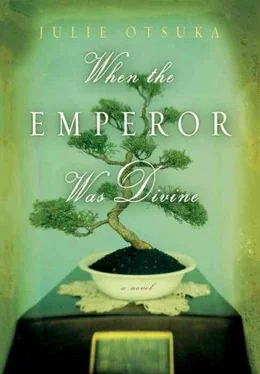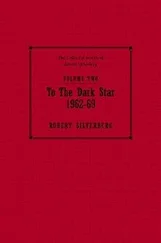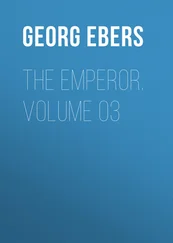The bird fluffed his wings and danced from side to side on his perch. “Baaaak,” he said.
“That’s not what I wanted to hear,” said the girl.
“Take off your hat,” said the bird.
The girl sat down and the woman gave her a glass of cold barley water and a long silver spoon. The girl licked the spoon and stared at her reflection. Her head was upside down. She dipped the spoon into the sugar bowl.
“Is there anything wrong with my face?” she asked.
“Why?” said the woman.
“People were staring.”
“Come over here,” said the woman.
The girl stood up and walked over to her mother.
“Let me look at you.”
“You took down the mirrors,” the girl said.
“I had to. I had to put them away.”
“Tell me how I look.”
The woman ran her hands across the girl’s face. “You look fine,” she said. “You have a fine nose.”
“What else?” asked the girl.
“You have a fine set of teeth.”
“Teeth don’t count.”
“Teeth are essential.”
The woman began to rub the girl’s shoulders. She told the girl to lean back and close her eyes and then she pressed her fingers deep into the girl’s neck until she felt her begin to relax. “If there was something wrong with my face,” the girl asked, “would you tell me?”
“Turn around,” the woman said.
The girl turned around.
“Now look at me.”
The girl looked at her.
“You have the most beautiful face I have ever seen.”
“You’re just saying that.”
“No, I mean it.”
The boy turned on the radio. The weatherman was giving the forecast for the next day. He was predicting rain and cooler temperatures. “Sit down and drink your water,” the boy said to his sister. “Don’t forget to take your umbrella tomorrow,” said the weatherman.
The girl sat down. She drank her barley water and began to tell the woman all about coniferous trees. Most of them were evergreens but some were just shrubs. Not all of them had cones. Some of them, like the yew, only had seedpods.
“That’s good to know,” said the woman. Then she stood up and told the girl it was time to practice the piano for Thursday’s lesson.
“Do I have to?”
The woman thought for a moment. “No,” she said, “only if you want to.”
“Tell me I have to.”
“I can’t.”
The girl went out to the living room and sat down on the piano bench. “The metronome’s gone,” she called out.
“Just count to yourself then,” said the woman.
“…THREE, FIVE, SEVEN…” The girl put down her knife and paused. They were eating supper at the table. Outside it was dusk. The sky was dark purple and a breeze was blowing in off the bay. Hundreds of jays were twittering madly in the Greers’ magnolia tree next door. A drop of rain fell on the ledge above the kitchen sink and the woman stood up and closed the window.
“Eleven, thirteen,” said the girl. She was practicing her prime numbers for Monday’s test.
“Sixteen?” said the boy.
“No,” said the girl. “Sixteen’s got a square root.”
“I forgot,” said the boy. He picked up a drumstick and began to eat.
“You never knew,” said the girl.
“Forty-one,” said the boy. “Eighty-six.” He wiped his mouth with a napkin. “Twelve,” he added.
The girl looked at him. Then she turned to her mother. “There’s something wrong with this chicken,” she said. “It’s too tough.” She put down her fork. “I can’t swallow another bite.”
“Don’t, then,” said the woman.
“I’ll eat it,” said the boy. He plucked a wing from his sister’s plate and put it into his mouth. He ate the whole thing. Then he spit out the bones and asked his mother where they were going the next day.
“I don’t know,” the woman said.
The girl stood up and left the table. She sat down at the piano and began to play a piece by Debussy from memory. “Golliwogg’s Cake Walk.” The melody was slow and simple. She had played it at a recital the summer before. Her father had sat in the front row of the audience and when she was finished he had clapped and clapped. She played the piece all the way through without missing a note. When she began to play it a second time the boy got up and went to his room and began to pack.
The first thing he put inside of his suitcase was his baseball glove. He slipped it into the large pocket with the red satin lining. The pocket bulged. He threw in his clothes and tried to close the lid but the suitcase was very full. He sat on top of it and the lid sank down slowly. Suddenly he stood up again. The lid sprang open. There was something he had forgotten. He went to the closet in the hall and brought back his polka-dotted umbrella. He held it out at arm’s length and shook his head sadly. The umbrella was too long. There was no way it would fit inside the suitcase.
THE WOMAN STOOD ALONE in the kitchen, washing her hands. The children had gone to bed and the house was quiet. The pipes were still hot from the day and the water from the faucet was warm. She could hear thunder in the distance—thunder and, from somewhere far off in the night, the faint wail of a siren. She looked out the window above the sink. The sky was still clear and she could see a full moon through the branches of the maple tree. The maple was a sapling with delicate leaves that turned bright red in the fall. Her husband had planted it for her four summers ago. She turned off the tap and looked around for the dish towel but it was not there. She had already packed the towels. They were in the suitcase by the door in the hall.
She dried her hands on the front of her dress and went to the birdcage. She lifted off the green cloth and undid the wire clasp on the door. “Come on out,” she said. The bird stepped cautiously onto her hand and looked at her. “It’s only me,” she said. The bird blinked. His eyes were black and bulbous. They had no center.
“Get over here,” he said, “get over here now.” He sounded just like her husband. If she closed her eyes she could easily imagine that her husband was right there in the room with her.
The woman did not close her eyes. She knew exactly where her husband was. He was sleeping on a cot—a cot or maybe a bunk bed—somewhere in a tent at Fort Sam Houston where the weather was always fine. She pictured him lying there with one arm flung across his eyes and then she kissed the top of the bird’s head.
“I am right here,” she said. “I am right here, right now.”
She gave the bird a sunflower seed and he cracked the shell open in his beak. “Get over here,” he said again.
She opened the window and set the bird out on the ledge.
“You’re all right,” the bird said.
She stroked the underside of his chin and he closed his eyes. “Silly bird,” she whispered. She closed the window and locked it. Now the bird was outside on the other side of the glass. He tapped the pane three times with his claw and said something but she did not know what it was. She could not hear him anymore.
She rapped back.
“Go,” she said. The bird flapped his wings and flew up into the maple tree. She grabbed the broom from behind the stove and went outside and shook the branches of the tree. A spray of water fell from the leaves. “Go,” she shouted. “Get on out of here.”
The bird spread his wings and flew off into the night.
She went back inside the kitchen and took out a bottle of plum wine from beneath the sink. Without the bird in the cage, the house felt empty. She sat down on the floor and put the bottle to her lips. She swallowed once and looked at the place on the wall where The Gleaners had hung. The white rectangle was glowing in the moonlight. She stood up and traced around its edges with her finger and began to laugh—quietly at first, but soon her shoulders were heaving and she was gasping for breath. She put down the bottle and waited for the laughter to stop but it would not, it kept on coming until finally the tears were running down her cheeks. She picked up the bottle again and drank. The wine was dark and sweet. She had made it herself last fall. She took out her handkerchief and wiped her mouth. Her lips left a dark stain on the cloth. She put the cork back into the bottle and pushed it in as far as it would go. “La donna è mobile,” she sang to herself as she went down the stairs to the basement. She hid the bottle behind the old rusted furnace where no one would ever find it.
Читать дальше












